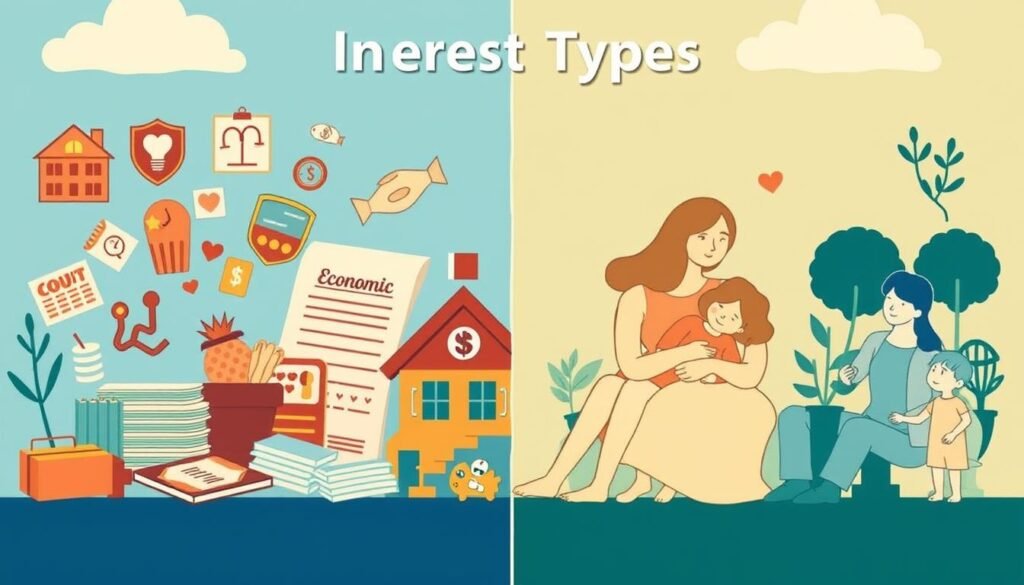Ever thought about why life insurance companies ask for proof of “insurable interest” when you apply for coverage? This idea might seem strange, but it’s really important. It makes sure life insurance is used to protect finances, not for fraud. So, when exactly must you show you have insurable interest to get a life insurance policy?
Key Takeaways
- Insurable interest is a key need for getting a life insurance policy on someone else.
- It makes sure the policyholder would face financial trouble if the insured person died.
- Knowing what insurable interest is and why it matters is vital for dealing with life insurance rules.
- Family ties and business needs usually count as insurable interest.
- Before giving out a policy, insurers check for insurable interest to stop fraud or misuse.
Understanding insurable interest is essential to know when and why it’s needed for life insurance. Let’s look into this important insurance rule more closely.
Understanding Insurable Interest in Life Insurance
What is Insurable Interest?
Insurable interest in life insurance means you have a financial stake in someone else’s life. It’s about having a reason to worry if they were to pass away. This is different from home and auto insurance, where you must have a stake at the time of loss.
In life insurance, you only need to have a stake when you buy the policy. This makes it easier to get coverage for people you care about.
Insurable Interest Definition and Importance
Having insurable interest is key to stopping fraud and moral hazards. It means you have a financial or emotional reason to want the person to stay alive. Before a life insurance company can issue a policy, they need proof of insurable interest.
If an application doesn’t show clear insurable interest, it might get rejected. Insurers check for this before they approve coverage. They might ask for things like financial records or court orders to prove it.
Insurable interest helps keep insurance honest. It makes sure money goes to those who really need it, not for bad reasons. It’s what makes insurance different from betting.
| Insurable Interest Concept | Purpose | Significance |
|---|---|---|
| Existing financial stake or sentimental relationship with the insured | Prevent fraud and moral hazards, ensure indemnification | Required for valid life insurance contracts, protects insurance companies and policyholders |

“Insurable interest serves as a safeguard for insurance companies to prevent policies being used for ill intent or fraud.”
When Must Insurable Interest Exist in a Life Insurance Policy
In the world of life insurance, insurable interest is key. It means the policy owner must have a real financial or personal reason to care about the insured’s life. This stops the policy from being used for risky bets, ensuring it’s for real financial safety.
Buying life insurance on your own life always meets the insurable interest rule. As the owner and insured, you automatically have an interest in your own life. This lets you pick anyone as your beneficiary, even if they don’t have a direct interest in your life.
But, things change when you buy life insurance on someone else’s life. You need to show a real reason to care about their life, like family ties or a business partnership. Buying insurance on a stranger’s life without a valid reason is illegal and your application will be turned down.
The insurable interest requirement for life insurance is set by state and federal laws. These life insurance insurable interest rules keep the insurance industry honest and stop misuse of insurable interest policies. Breaking these insurable interest regulations can lead to big legal and financial problems.
Knowing the insurable interest guidelines is vital in life insurance. By making sure the when must insurable interest exist rule is followed, you protect your financial future and that of your loved ones.

Examples of Insurable Interest Relationships
Insurable interest can be found in many family and business ties. In family ties, spouses, parents, children, and even grandchildren usually have insurable interest without needing to show financial dependence. But, cousins, uncles, and aunts might not automatically have it.
Family Relationships with Insurable Interest
In life insurance, spouses and close family members often get insurable interest. This is because of their emotional and financial bonds. For instance, a spouse can buy a life insurance policy on their partner, or a parent can insure their child’s life.
This shows the value of these relationships, even if there’s no direct financial link.
Business Relationships with Insurable Interest
Insurable interest also applies in business settings. The death of a key employee or partner could cause big financial problems. For example, a sports team might insure a star player’s life, or law firm partners might insure each other’s lives to keep their business stable.
Knowing about insurable interest is key for both people and businesses to get the right insurance. By understanding which relationships qualify, policyholders can protect their interests well.
Economic vs. Sentimental Insurable Interest
Life insurance and insurable interest are closely tied. But, did you know that insurable interest isn’t just about money? Sentimental insurable interest, based on love and affection, can also be a reason for a life insurance policy.
In states like Pennsylvania, a blood or marriage tie to the insured is enough for insurable interest. This means you don’t need to be financially dependent. The emotional bond and wish to protect your loved one can justify the policy.
However, if you’re not related by blood or marriage, you must show a financial link to the insured. This could be through financial dependency or another economic tie that would suffer if they passed away.
Knowing the difference between economic and sentimental insurable interest is key. It helps decide who can be insured and ensures the policy provides the needed financial security. This area is complex but crucial to understand.
“Insurable interest is a key requirement for insurance policies to mitigate financial loss and prevent moral hazards.”
Whether your interest is economic or emotional, it must exist for a life insurance policy to be valid. Remembering this can guide you in protecting your loved ones.

Proving Insurable Interest for Life Insurance
To get life insurance, you must show you have an insurable interest in the person being insured. This step is key to keeping the insurance world honest. It makes sure the policy really helps those who need it most.
Required Documentation and Processes
Showing you have an insurable interest is a big part of getting life insurance. The insurance company will ask for proof or consent to check if you really have an interest. This might mean:
- Signing the life insurance application or policy, which shows the insured person agrees.
- Doing a phone interview with the insurance company. Here, the applicant or the person named as a beneficiary can talk about their relationship.
If the insurance company finds you don’t have an insurable interest, they won’t approve your application. This rule helps keep the insurance world fair. It makes sure life insurance policies do what they’re meant to do.
| Insurable Interest Scenario | Proof and Consent Required |
|---|---|
| Married couples | No extra proof needed; it’s assumed they share finances. |
| Cohabiting unmarried couples | They need to show they share financial responsibilities, like bills or debts. |
| Business partners | They must prove their business tie and why they need to protect it. |
| Families insuring dependent relatives | They need to show they financially support and depend on each other. |
Knowing about insurable interest documentation and the insurable interest application process helps. It makes sure you can smoothly get insurable interest verification and insurable interest consent for life insurance.
Conclusion
The idea of life insurance insurable interest is key in the insurance world. It stops fraud and makes sure policies work as they should. Knowing the insurable interest requirements, insurable interest regulations, and insurable interest guidelines is important for anyone looking at life insurance.
Following insurable interest importance rules helps keep the industry honest. It also protects policyholders from being taken advantage of. This means checking if there’s a real financial or emotional tie between the policy owner and the insured. It also makes sure the policy isn’t used for bad or risky reasons.
This deep dive into life insurance insurable interest has given you key insights. Now, you can choose life insurance wisely. This ensures your coverage meets your needs and follows the law. It gives you and your family the financial safety you need.
FAQ
What is insurable interest in life insurance?
Insurable interest means you have a financial reason to want someone to stay alive. It’s needed for life insurance policies on others. You must face financial loss if they die.
When must insurable interest exist for a life insurance policy?
You always need insurable interest for life insurance. But it’s about the policy owner, not the insured. If you want to protect someone without insurable interest, buy a policy on your life. Name them as the beneficiary.
What types of relationships establish insurable interest?
Many family and business ties can have insurable interest. Family ties like spouses, parents, children, and grandchildren often qualify without needing to prove financial loss. In business, insurable interest can apply if a key person’s death would hurt the company financially.
Can insurable interest be based on sentimental factors?
Yes, life insurance can value sentimental ties too. Love and affection can create insurable interest, even without financial ties. This includes blood or marriage relationships.
How is insurable interest proven for life insurance?
To prove insurable interest, you go through the life insurance application process. You need to show you have a reason to want the person alive. This is done by signing the application or agreeing over the phone.
